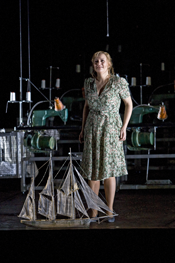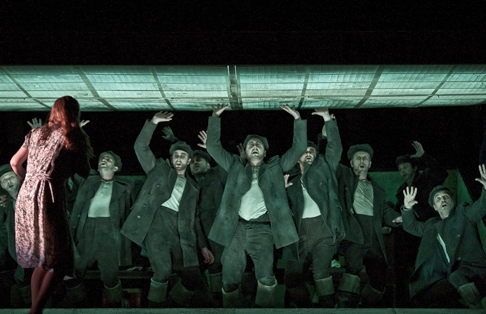Recently in Reviews
English Touring Opera are delighted to announce a season of lyric monodramas to tour nationally from October to December. The season features music for solo singer and piano by Argento, Britten, Tippett and Shostakovich with a bold and inventive approach to making opera during social distancing.
This tenth of ten Live from London concerts was in fact a recorded live performance from California. It was no less enjoyable for that, and it was also uplifting to learn that this wasn’t in fact the ‘last’ LfL event that we will be able to enjoy, courtesy of VOCES8 and their fellow vocal ensembles (more below …).
Ever since Wigmore Hall announced their superb series of autumn concerts, all streamed live and available free of charge, I’d been looking forward to this song recital by Ian Bostridge and Imogen Cooper.
The Sixteen continues its exploration of Henry Purcell’s Welcome Songs for Charles II. As with Robert King’s pioneering Purcell series begun over thirty years ago for Hyperion, Harry Christophers is recording two Welcome Songs per disc.
Although Stile Antico’s programme article for their Live from London recital introduced their selection from the many treasures of the English Renaissance in the context of the theological debates and upheavals of the Tudor and Elizabethan years, their performance was more evocative of private chamber music than of public liturgy.
In February this year, Albanian soprano Ermonela Jaho made a highly lauded debut recital at Wigmore Hall - a concert which both celebrated Opera Rara’s 50th anniversary and honoured the career of the Italian soprano Rosina Storchio (1872-1945), the star of verismo who created the title roles in Leoncavallo’s La bohème and Zazà, Mascagni’s Lodoletta and Puccini’s Madama Butterfly.
Evidently, face masks don’t stifle appreciative “Bravo!”s. And, reducing audience numbers doesn’t lower the volume of such acclamations. For, the audience at Wigmore Hall gave soprano Elizabeth Llewellyn and pianist Simon Lepper a greatly deserved warm reception and hearty response following this lunchtime recital of late-Romantic song.
Collapsology. Or, perhaps we should use the French word ‘Collapsologie’ because this is a transdisciplinary idea pretty much advocated by a series of French theorists - and apparently, mostly French theorists. It in essence focuses on the imminent collapse of modern society and all its layers - a series of escalating crises on a global scale: environmental, economic, geopolitical, governmental; the list is extensive.
For this week’s Live from London vocal recital we moved from the home of VOCES8, St Anne and St Agnes in the City of London, to Kings Place, where The Sixteen - who have been associate artists at the venue for some time - presented a programme of music and words bound together by the theme of ‘reflection’.
'Such is your divine Disposation that both you excellently understand, and royally entertaine the Exercise of Musicke.’
Amongst an avalanche of new Mahler recordings appearing at the moment (Das Lied von der Erde seems to be the most favoured, with three) this 1991 Mahler Second from the 2nd Kassel MahlerFest is one of the more interesting releases.
‘And there was war in heaven: Michael and his angels fought against the dragon; and the dragon fought and his angels, And prevailed not; neither was their place found any more in heaven … that old serpent … Satan, which deceiveth the whole world: he was cast out into the earth, and his angels were cast out with him.’
If there is one myth, it seems believed by some people today, that probably needs shattering it is that post-war recordings or performances of Wagner operas were always of exceptional quality. This 1949 Hamburg Tristan und Isolde is one of those recordings - though quite who is to blame for its many problems takes quite some unearthing.
There was never any doubt that the fifth of the twelve Met Stars Live in Concert broadcasts was going to be a palpably intense and vivid event, as well as a musically stunning and theatrically enervating experience.
‘Love’ was the theme for this Live from London performance by Apollo5. Given the complexity and diversity of that human emotion, and Apollo5’s reputation for versatility and diverse repertoire, ranging from Renaissance choral music to jazz, from contemporary classical works to popular song, it was no surprise that their programme spanned 500 years and several musical styles.
The Academy of St Martin in the Fields have titled their autumn series of eight concerts - which are taking place at 5pm and 7.30pm on two Saturdays each month at their home venue in Trafalgar Square, and being filmed for streaming the following Thursday - ‘re:connect’.
The London Symphony Orchestra opened their Autumn 2020 season with a homage to Oliver Knussen, who died at the age of 66 in July 2018. The programme traced a national musical lineage through the twentieth century, from Britten to Knussen, on to Mark-Anthony Turnage, and entwining the LSO and Rattle too.
With the Live from London digital vocal festival entering the second half of the series, the festival’s host, VOCES8, returned to their home at St Annes and St Agnes in the City of London to present a sequence of ‘Choral Dances’ - vocal music inspired by dance, embracing diverse genres from the Renaissance madrigal to swing jazz.
Just a few unison string wriggles from the opening of Mozart’s overture to Le nozze di Figaro are enough to make any opera-lover perch on the edge of their seat, in excited anticipation of the drama in music to come, so there could be no other curtain-raiser for this Gala Concert at the Royal Opera House, the latest instalment from ‘their House’ to ‘our houses’.
"Before the ending of the day, creator of all things, we pray that, with your accustomed mercy, you may watch over us."
Reviews
![Bryn Terfel as the Dutchman [Photo by Clive Barda courtesy of The Royal Opera House]](http://www.operatoday.com/Dutchman_Terfel_ROH09.png)
27 Feb 2009
A restrained Flying Dutchman at the Royal Opera House, London
This Der fliegende Holländer was eagerly awaited as it hasn’t been heard at the Royal Opera House, London, since 2000. With Bryn Terfel’s return to Covent Garden as the Dutchman guaranteed a full house.
Terfel’s admirers would not have been disappointed. His voice boomed
with authority, impressive for its strength, even when he had to sing
dragging a heavy rope across the stage and wade through the real water at the
front of the platform. Terfel’s vocal power always impresses, and he has
done interesting Dutchmen elsewhere. However, in this production, by
Tim Albery, he was not called upon to develop the character. Not long ago,
Albery presented Boris Gudonov as stolid, mild-mannered bourgeois.
This Dutchman was no more ravaged than Daland. When the women and
Daland’s sailors call out to the doomed souls on the haunted ship, they
face the audience and shine lights into the auditorium. When the Dutchman’s
crew do appear, they’re neatly dressed in uniform, as if they’d never
been to sea. Maybe there’s some deep meaning in this, but it could have
been thought through with more focus.
 Anja Kampe as Senta
Anja Kampe as Senta
The performance was more interesting, though, for what it brought out in
the music. That glorious overture is a marvel of dramatic scene-painting,
setting the mood for the entire opera. How it’s staged reflects on the
whole production. Here it unfolded against a backdrop of green light and
projected images of rain, with shadowy figures flitting from left to right.
This was interesting, but hardly enough to sustain interest for that period
of time. Nor did it vary, although the score itself is characterized by
distinct developmental phases. This was disappointing because Marc
Albrecht’s conducting shaped these changing themes very clearly, for they
define the duality that is fundamental to the whole opera.
Albrecht’s approach revealed the underlying structure. Wagner wields
leitmotivs like weapons. By juxtaposing the sailor’s cheery love songs with
the savagery of the music associated with the storm and the Dutchman, he
draws contrasts, between stability and chaos. Particularly brilliant are the
crosscurrents in Act Three, throwing the music of the village against the
music of the haunted sailors. This act depicts a “storm on land”, just as
the first depicts a storm at sea. Keeping the different ensembles distinct is
important here, and takes some sophistication. But the Royal Opera House
Chorus excels in intricate ensemble. At last the production sprang to life,
animated by the sheer vitality of the singing.
 A scene from Der fliegende Holländer with Anja Kampe (Senta) in the foreground
A scene from Der fliegende Holländer with Anja Kampe (Senta) in the foreground
Indeed, the role of the chorus in this opera is sometimes underplayed
since attention usually centres on the Dutchman and on Senta. The influence
of Weber still hung heavily on Wagner. Some of these choruses are reminiscent
of Der Freischütz, another tale of demonic forces. Thus
Albrecht’s vignette-like focus reflects episodic “aria” opera tradition
rather than the overwhelming sweep of late Wagner in full sail. Der
fliegende Holländer is only the first stage of the saga.
Bryn Terfel may have been the big draw, but perhaps this production will
be remembered as the moment Anja Kampe made her name. Anyone who can steal a
scene from Terfel is worth listening to. From Kampe’s small frame emanated
a voice of great power, enhanced by an understanding of Senta’s role. Even
before she meets the Dutchman, she fantasizes about him. The other women work
in a factory, but Senta is by nature a non-conformist, drawn to the wildness
that the Dutchman symbolises. No wonder she knows right away she wants him,
not Erik. Senta is the prototype of Wagner’s later heroines who equate love
with death, and who find fulfilment in redeeming others. This does reflect in
many ways Wagner’s own predicaments, but the archetype becomes wilder and
more cataclysmic. Kampe probably has the ability to make much more of such
heroines in the future, given the productions that make more of the extreme
intensity - madness, even - in these roles. She’s singing Isolde at
Glyndebourne this summer, which will be something to look forward to.
Anne Ozorio
![Bryn Terfel as the Dutchman [Photo by Clive Barda courtesy of The Royal Opera House]](http://www.operatoday.com/Dutchman_Terfel_ROH09.png)

